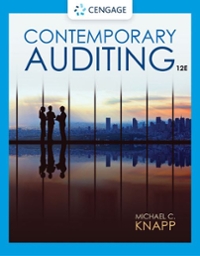Two congressional investigations in the 1970s provided for the first time revealing insights into the internal operations
Question:
Two congressional investigations in the 1970s provided for the first time revealing insights into the internal operations of the eight major accounting firms that had dominated the U.S. accounting profession for decades. Those "Big Eight" firms were the key members of what was coined “The Accounting Establishment” by the two congressional investigative subcommittees. In fact, that uncomplimentary expression was the title given to the massive report produced by the U.S. Senate investigation. The business press commonly referred to the two congressional investigations of the accounting profession as the Metcalf Committee and Moss Committee hearings. U.S. Senator Lee Metcalf chaired the Senate subcommittee that investigated the accounting profession, while U.S. Representative John Moss chaired the comparable investigation by a U.S. House of Representatives subcommittee. Both Senator Metcalf and Representative Moss were members of the Democratic Party. Critics insisted that significant cash donations made by Big Eight firms to the 1972 reelection campaign of President Nixon, a member of the Republican party, had prompted the two congressional investigations.
The Metcalf Committee report alleged that the “Big Eight firms have seriously impaired their independence by becoming involved in the business affairs of their corporate clients, and by advocating their clients’ interests on controversial issues.”4
The report went on to note that the Big Eight firms had joined “business lobbies” that “actively represent” their corporate clients’ economic interests.5 Specific examples provided by the Metcalf Committee of Big Eight firms’ lobbying activities included their efforts to influence (1) the choice of accounting principles for the oil and gas industry, (2) the determination of which expenditures should be considered reimbursable costs for private contractors doing business with the federal government, and (3) corporate taxation policies being considered by federal legislators.
The Metcalf Committee report noted that Big Eight firms, in some cases, had been compensated by corporate clients for their lobbying activities while, in other cases, had engaged in the activities as a “public service” for the given clients. In either circumstance, the Metcalf Committee maintained the lobbying activities were “highly improper.”
Questions
1. An international news agency discovered the auditor independence infractions committed by EY. Does this fact suggest that regulatory enforcement within the U.S. financial reporting domain is lax? Defend your answer.
2. Should the SEC/PCAOB provide a complete list of non-audit services that independent auditors are prohibited from providing to their public company audit clients? Defend your answer.
3. Should accounting firms be permitted to provide lobbying or legislative advisory services to non-audit clients? Why or why not? Should accounting firms be permitted to lobby rule-making bodies regarding proposed accounting standards? Again, defend your answer.
4. Who approves or should approve the non-audit services that SEC registrants purchase from their independent audit firms?
Step by Step Answer:






